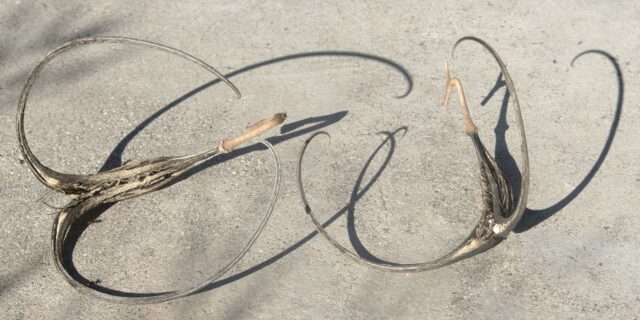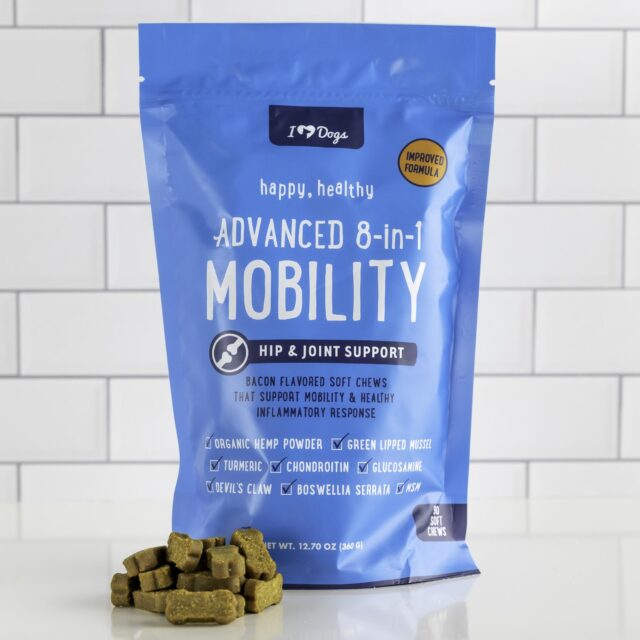Most dogs love to run around and play as much as possible, but joint problems can get in the way of that joy. While senior dogs are the most at risk for joint inflammation, dogs of all ages could face mobility issues. Giving your dog joint supplements is the best way to prevent those future concerns. Canine joint supplements contain a wide range of unique ingredients, including devil’s claw for dogs.
Devil’s claw might sound unusual, but it’s a beneficial plant for humans and animals to ingest. So, if you’re worried about your pup slowing down and missing out on exciting playtime, you might want to consider giving them devil’s claw or similar ingredients. A joint supplement could be just what they need to feel like a puppy again!

Is Devil’s Claw Safe For Dogs?
Yes, devil’s claw is safe for dogs. It’s a natural and effective remedy for joint pain in humans and pets. However, like all ingredients, it could become dangerous if given in improper doses or if given to dogs with underlying conditions. Talk to your vet before starting your pup on a devil’s claw supplement.
Devil’s claw is also known as harpagophytum, grapple plant, or wood spider. While none of its names are particularly appealing, it’s an excellent ingredient for anti-inflammatory properties. It’s a flowering plant native to South Africa. One of the most notable qualities is its hooks, which are curved and appear to protect the flower.
Indigenous people have used parts of this plant for medicinal purposes for a long time. They discovered that it could relieve pain and inflammation, especially related to arthritis. Most of their medicines were made from the plant’s claw-like roots.
This plant wasn’t introduced to Europe until the 1900s. Word of its anti-inflammatory properties grew, which is why it’s now used in joint supplements worldwide. Today, it’s becoming popular in pet products for similar reasons.
Why is it Called Devil’s Claw?
You might be wondering why a beneficial plant has such an ominous name. The name of this plant has nothing to do with anything mysterious or sinister. Instead, it’s simply named after the spooky claw-like hooks covering the fruit.

Related: The 10 Best Calming Supplements for Dogs
What Are Devil’s Claw Benefits for Dogs?
Dogs take devil’s claw mainly to reap the anti-inflammatory benefits. With less discomfort throughout your dog’s body, they can enjoy life to the fullest. Here are some details about how this ingredient might make your furry friend’s life better!
Reduces Inflammation
In general, this plant can reduce all types of inflammation. When your dog’s body gets injured, whether it’s a one-time incident or related to long-term issues, their body naturally responds by causing inflammation. Devil’s claw is made up of chemicals that can reduce or prevent swelling in your dog’s body. So, if they get hurt, their body will be less likely to be sore and inflamed while taking this ingredient. This is especially beneficial for aging dogs prone to joint, back, and neck pain.

Improves Joint-Related Issues
Not only can devil’s claw prevent general joint pain, but it can also help with more severe joint issues, such as osteoarthritis and gout. The odds of an older dog developing osteoarthritis or a similar condition are high. Serious joint problems like that are caused by the wear and tear of joints over time. However, reducing the amount of inflammation in a dog’s body can also reduce the damage from frequent use.
Gout isn’t as common as osteoarthritis, but it’s still a form of arthritis. It’s caused by a buildup of uric acid in your canine’s bloodstream. Devil’s claw may be able to reduce that excess uric acid in addition to reducing the pain.
Benefits Digestion
While the main benefit of devil’s claw is reducing inflammation, it may also promote healthy digestion. This plant contains flavonoids and phytosterols, which can increase bile production to help your dog digest and absorb food better. Their tummy will also benefit from less inflammation in the digestive system, which is often caused by acid reflux.
Does Your Dog Need a Joint Supplement?
All dogs can benefit from a joint supplement, even if they haven’t shown signs of joint pain yet. The dogs that need it most are active dogs and breeds prone to joint pain. Yet, it can’t hurt to start giving your pup a joint supplement even if they’re not at high risk.

However, if your dog already has a severe joint problem, devil’s claw might not make a significant difference. Here are some signs that your dog has a serious joint condition:
- Limping
- Reduced mobility
- Whining
- Weight gain
- Struggling to go up/down stairs
- Lethargy
- Aggression
If your dog is displaying any of the above symptoms, talk to your vet before moving forward with a remedy. In most cases, devil’s claw will help, but if their symptoms are related to something more severe, they may need special treatment for their health to improve fully.
Related: 10 Best Eye Supplements for Dogs
What Are Devil’s Claw Dosages for Dogs?
Devil’s claw comes in many varieties for dogs. So, the dosage will vary based on the product and what your dog is using it for. Most products will have the recommended dosage listed on the packaging, so follow those doses. When in doubt, ask your vet to make sure the recommended dose is safe for your furry friend.
If the supplement is in a chew or tablet form, the dose will usually be between one and three chews. 250 mg per tablet is typical for small dogs, while larger dogs need between 500 and 1,000 mg per tablet. However, if it’s in a powder or liquid form, you’ll need to measure it out and mix it with your dog’s food.
Here are the recommended doses for powdered devil’s claw:
- Small Dogs (44 pounds or less) – 1/10th teaspoon
- Large Dogs (45 to 88 pounds) – 1/5th teaspoon
- Giant Dogs (over 88 pounds) – 1/3rd teaspoon

These servings might seem small, but a little devil’s claw can go a long way. Again, these are just general recommendations. The most accurate dosing will be on the container or as directed by a vet. If you’re worried about how your pup will react, start with a smaller than recommended serving. Then, slowly work your way up to the dosage and watch for side effects.
Related: 12 Best Dog Breath Fresheners
What Are Devil’s Claw Side Effects On Dogs?
Side effects of devil’s claw are rare, but any ingredient can cause issues if the doses are too high. The most common side effect for both humans and animals is diarrhea and other digestive problems. Luckily, the symptoms are usually mild.
Dogs with stomach ulcers, duodenal ulcers, or gallstones shouldn’t take devil’s claw since it could worsen their condition. If your dog shows any unusual reactions after taking devil’s claw, you should contact your vet right away.
Are There Any Drug Interactions With Devil’s Claw For Dogs?
There are very few drug interactions for devil’s claw. The biggest concern is blood-thinning medication because devil’s claw can also thin blood. Anticoagulants, cardiac medications, and antiarrhythmics may also interact with this ingredient.
Before you start giving your dog any new supplement or medication, you should tell your vet about anything else your dog regularly takes. Then, your vet can confirm whether or not those drugs will affect the new supplement.

How to Serve Devil’s Claw to Dogs?
Devil’s claw is rarely sold on its own. Instead, it comes in canine supplements, which are often in the form of capsules, powders, liquids, or chewables. It’s up to you to decide which form is best for your dog.
Powder and liquid forms are easy to mix with your dog’s food, but it can be difficult to hide them if your pup is picky. With pills, tablets, and capsules, you can hide them in a treat or pill pocket to ensure that your dog eats them. However, chews are often the easiest form to serve because they look and smell like treats. So, dogs will think they’re eating a snack instead of a supplement.
However, when choosing any pet product, it’s important to buy from a company you trust. Look closely at the packaging details and ingredient list to ensure that it seems healthy and safe for your dog. When in doubt, talk to your vet about which canine supplement has the best formula.
Related: The 13 Best Heart Supplements for Dogs
Tasty Joint Relief!
The biggest problem that devil’s claw can help with is joint inflammation. So, if you’re looking for a tasty, chewy joint supplement, you might want to try the iHeartDogs Advanced 8-in-1 Hip & Joint Chews. These supplements are designed to reduce painful inflammation, prevent cartilage breakdown, and improve mobility.
In addition to devil’s claw, these chews include many other inflammation-reducing ingredients, such as glucosamine, omega-rich organic hemp powder, MSM, chondroitin, green-lipped mussels, organic turmeric, and Boswellia serrata. Plus, every package purchased donates 14 healthy meals to shelter dogs. So, you’ll be helping animals in need while also keeping your furry friend in great shape.
Dogs face joint pain more than humans realize. But that discomfort shouldn’t prevent them from enjoying the fun of running around and playing with their loved ones. So, consider giving them an ingredient like devil’s claw to help reduce their joint pain. It could be life-changing for them!
- Best Joint Supplement for Dogs
- Best CBD Gummies for Dogs
- Goat's Milk for Dogs
- Skin & Coat Supplements for Dogs
- Weight Gain Supplements for Dogs
- Muscle Building Supplements for Dogs
- Heart Supplements for Dogs
- Multivitamins for Dogs
- Pill Pockets for Dogs
- Digestive Enzymes for Dogs
- Turmeric for Dogs
- Liver Supplements for Dogs
- Tear Stain Supplement for Dogs
- Breath Fresheners for Dogs
- Kidney, Urinary, & Bladder Supplements for Dogs
- Stool Eating Deterrent for Dogs
- Eye Supplements for Dogs
- Melatonin for Dogs
- Apple Cider Vinegar for Dogs
- Green Lipped Mussels for Dogs
- L Theanine for Dogs
- Chondroitin Supplements for Dogs
- MSM for Dogs
- Valerian Root for Dogs
- Chamomile for Dogs
- Boswellia for Dogs
- L Tryptophan for Dogs
- Yucca for Dogs
- Licorice Root for Dogs
- Bromelain for Dogs
- Papain for Dogs
- Devil's Claw for Dogs
- Quercetin for Dogs
- Hemp gummy for dogs
- Best Hemp Dog Treats
- Best Hemp Oil for Dogs
- Best Calming Treats, Chews, & Supplements for Dogs
- Best Bone Broth for Dogs
- Best Fish Oil for Dogs
- Best Probiotics for Dogs
- Best Hip Dysplasia Supplements for Dogs
- Best Colostrum for Dogs
- Best Quercetin for Dogs
- Best Greens for Dogs Supplements
- Best Vitamin C Supplements for Dogs
- Best Probiotic for Dog with Allergies
- Best Taurine Supplements for Dogs
- Best Dog Food Toppers
- Best Anal Gland Supplement for Dogs
- Best Dog Probiotic Powder
- Best CoQ10 Supplement for Dogs
- Best Liquid Glucosamine for Dogs
- Best Wrinkle Creams, Balms, and Wipes for Dogs
- Best Puppy Calming Treats
- Best Colloidal Silver for Dogs
- Best Adaptogen Supplements for Dogs
- Best Cognitive Supplements for Dogs
- Best Bee Pollen for Dogs
- Best Vitamin A Supplements for Dogs
- Best Vitamin E Supplements for
- Best Liquid Glucosamine Supplements for Dogs
- Best SAM-e Supplements for Dogs
- Best Hyaluronic Acid Supplements for Dogs
- Best Apple Cider Vinegar Supplements for Dogs
- Best Diarrhea Medicine for Dogs
- Best Milk Thistle for Dogs
- Best Turkey Tail Mushroom Supplements for Dogs
- Best Astaxanthin Supplements for Dogs
- Best Lutein Supplements for Dogs
- Best Electrolyte Supplements for Dogs
- Best Coconut Oil for Dogs
- Best Prenatal Vitamins for Dogs
- Best Puppy Milk Replacements
- Best Iron Supplements for Dogs
- Best Dewormer Products for Dogs
- Best Mange Medications for Dogs
- Best Cough Relief Products for Dogs
- Best Sinus Relief Products for Dogs
- Best Collapsed Trachea Supplements for Dogs
- Best Fireworks Anxiety Relief Products for Dogs
- Best Thunderstorm Anxiety Relief Products for Dogs
- Best Travel Anxiety Relief Product for Dogs
- Best Supplements for a Dog with a Torn ACL
- Best Supplements for a Dog with Patellar Luxation
- Best Supplements for a Dog with Intervertebral Disc Disease
- Best Zinc Supplements for Dogs
- Best Biotin Supplements for Dogs
- Best Tart Cherry Supplements for Dogs
- Best Resveratrol Supplements for Dogs
- Best Ginkgo Biloba Supplements for Dogs
- Best Ashwagandha Supplements for Dogs
- Best Supplements for Dogs with Cushing's Disease
- Best Adrenal Supplements for Dogs
- Best NAD+ Supplements for Dogs
- Best NMN Supplements for Dogs
- Best Supplements for Dogs with Dementia
- Best Supplements for Dogs with CCD(Canine Cognitive Dysfunction)
- Best Fiber Supplements for Dogs
- Best Spirulina for Dogs
- Best Hairball Remedies for Dogs
- Best Eye Drops for Dogs with Allergies
- Best Magnesium Supplements for Dogs
- Best Brushes for Double-Coated Dogs
- Best Dandelion Root Supplements for Dogs
- Best Probiotic for Dogs with Yeast Infections
- Best Flaxseed Oil for Dogs
- Best Chamomile Supplements for Dogs
- Best Lavender Supplements. Treats & Sprays for Dogs
- Best Collagen Supplements for Dogs
- Best Kelp Supplements for Dogs
- Best Activated Charcoal for Dogs
- Best Slippery Elm Supplements for Dogs
- Best Supplements for Dogs with Seizures & Epilepsy
- Best Antioxidant Supplements for Dogs
- Best Ubiquinol Supplements for Dogs
- Best Hormone & Glandular Supplements for Dogs
- Best Thyroid Supplements for Dogs
- Best Iodine Supplements for Dogs
- Best Dog Shedding Supplements for Dogs
- Best Detox Supplements for Dogs
- Best Postbiotics for Dogs
- Best Aspirin Products for Dogs
- Best Dog Anti-Nausea Products
- Best Dog Mouthwashes
- Best Camelina Oils for Dogs
- Best Hemp Seed Oils for Dogs
- Best Natural Anti-Inflammatories for Dogs
- Best Cancer Supplements for Dogs
- Best Sardine & Anchovy Oils for Dogs
- Best Fatty Acid Supplements for Dogs
- Best Chia Seed Supplements & Treats for Dogs
- Best Olive Oils for Dogs
- Best Amino Acid Supplements for Dogs
- Best Moringa Supplements for Dogs
- Best Echinacea Supplements for Dogs
- Best Cranberry Supplements for Dogs
- Best D-Mannose Supplements for Dogs
- Best Nettle Leaf Supplements for Dogs
- Best Marshmallow Root Supplements for Dogs
- Best Astragalus Supplements for Dogs
- Best Pumpkin Seed Supplement for Dogs
- Best Supplements for a Dog Wetting The Bed
- Best Blueberry Supplement for Dogs
- Best Bromelain Supplements for Dogs
- Best Yucca Supplements for Dogs
- Best Ginger Supplements for Dogs
- Best Rosehip Supplements for Dogs
- Best Allergy Medicines for Dogs
- Best Reishi Mushroom Supplement for Dogs
- Best Maitake Mushroom Supplement for Dogs
- Best Chaga Mushroom Supplement for Dogs
- Best Shiitake Mushroom Supplement for Dogs
- Best Cordyceps Mushroom Supplement for Dogs
- Best Lion's Maine Supplement for Dogs
- Have question? - Ask in our Dog Health Forum

 Toledo, United States.
Toledo, United States.